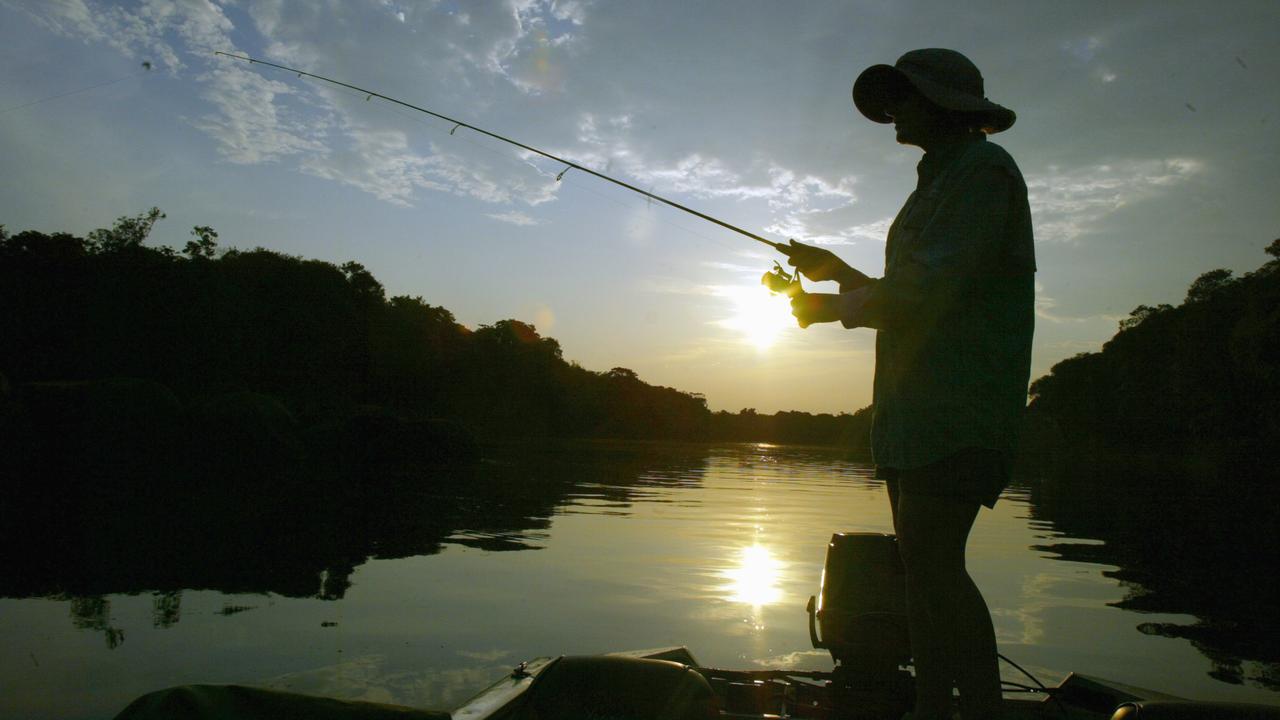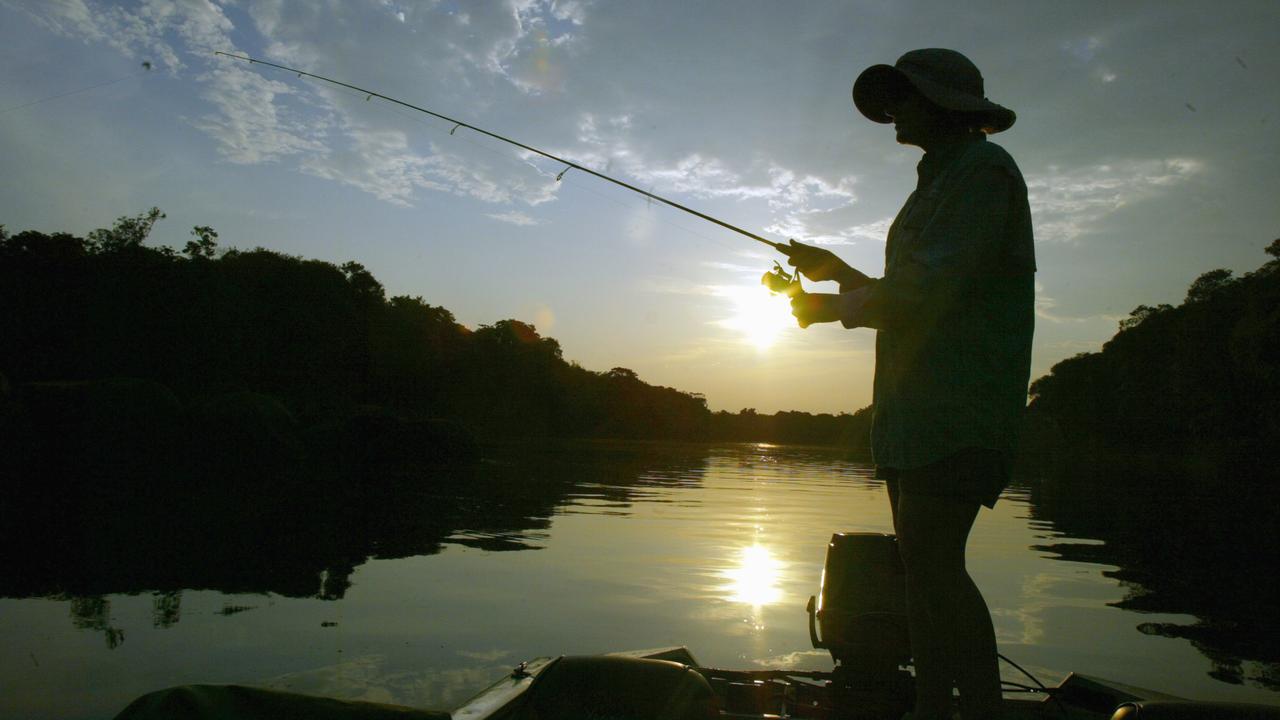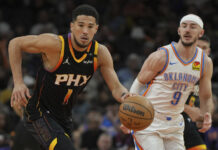
JASON GAY reckons his late father would be laughing his behind off about the whole thing. About now being drawn, despite himself, into the obsession of his nine-year-old son.
My son Jesse and I learned to fish in the past couple of years — I mean, fishing-fishing, really fishing, the more involved stuff, patience and technique, not (yet) the wizardry of a fly rod but pretty much everything else. We have caught big ones and small ones, and we have lost big and small ones too. Most important, we are now able to bore anyone on earth with a 20-minute story about fishing, which is a true sign we’ve arrived as fishermen.
I know it sounds a little silly when you hear fishermen talk about how fishing changed their lives, because they always talk about how fishing changed their lives, but it changed our lives too. We are out there all the time, fishing, trying to add another fish to the list. Nothing’s ever enough. Jesse, who is 9, likes to say we are addicted, and that’s probably true. We are addicted. We can’t stop. It’s a problem. But it’s probably better than 90 hours of Bravo.
This is a profound detour for me. I was very good at hating fishing for many decades. My hatred was well-known. My father was a recreational fisherman of passion and some repute, and he must have asked me a thousand times to come with him, out to the bays and shallow inlets and roaring surf, and outside of one time I can remember, I don’t think I ever did.
The one time I did go fishing with my father, it was cold and dark and barren of fish; the only marine life I found was the skull of a rotting dead seal stuck in the boulders of a jetty. As my father kept fishing, I went back to the car to warm myself and listen to the radio. I remember this because that was the first time I heard “Juke Box Hero” by Foreigner, up to that point the coolest song I’d ever heard, and the next weekend I bought the album Foreigner 4. It says a lot about my childhood fishing career that I remember more about “Juke Box Hero” than I do anything about fishing with my father.
Fishing became something my father did, separately, apart from my brother and me, and he did it all the time, waking up at fireman hours and driving off to beaches far away from home. The garage was a tangle of rods and equipment, and his car, an old Nissan Altima, reeked lightly of bluefish. I don’t think I ever asked him if he caught anything. I just assumed he did.
Fishing was not for me. I did not fish as a kid, as a teenager, or during any part of early adulthood. Then Jesse arrived, and someone (not me) put a pole in his hand, and a fish grabbed the hook, and there was a yank, a screech, a reel, a catch, and honestly, that was that. Fishing was now something Jesse did. He did it at the dock at my wife Bessie’s family’s summer house on the St. Lawrence River, and then he wanted to fish every other place too. This is where I came in, reluctantly.
There were many things I did not know about fishing. Start with the basics: I did not know how to tie a hook on the end of the line. I mean, I could sloppily tie a hook, like I was tying a bow atop a pair of Air Jordans, but it was a useless knot that would come apart with the slightest tension. I had to learn all that — clinch knots, Palomar knots, blood knots, surgeon’s loops. (I still really only can do the clinch knots.) I had to learn how to bait a hook, cast, flip the bail, jig a lure, catch, and release. Almost all of the terminology (crankbaits, spinnerbaits, topwater) was a complete mystery. I had to learn about tides, and time, and the moon cycles, and wind. I had to learn an entirely new language, and if you know anything about me, you know I am horrible at learning new languages. I am barely passable at this one.
The proper way to learn all of this, of course, would have been from my father, when he was alive. He would have chuckled and probably made fun at me for coming to fishing after decades of rejecting it, but he would have been thrilled to have his grandson along on the adventure. There’s part of me that thinks this twist in my life is engineered by the ghost of my deceased father, who is somewhere laughing his behind off about the whole thing, watching me in a bait shop trying to mumble my way through an awkward conversation with a salty clerk. There’s part of me who thinks this fishing development is not some fluky midlife detour or joyous new passion. It’s my father’s paranormal revenge.
*****
Instead, I read. I read Facebook fishing reports from people who spell “stripers” as “strippers” (“I landed three good strippers this weekend in Staten”), as well as blogs and trusty paperbacks from surf sages like John Skinner. I watch videos on YouTube that are so boring, they should come with a warning label that your eyes might fall out of your head. Have you ever watched a 19-minute video on knots? I would suggest you do not, especially the one I just watched, which was shakily produced and digressive, and the host had a mustard stain on his shirt. But he sure did know his knots, and I will only have to watch the video 22 more times in order to remember how to tie them.
The best way to learn to fish is like everything else: in person, with someone who knows what they are doing. The good news is that there is always someone who knows much more than you do, and most of them are happy to share the basics, especially when they see you standing there with a child, which produces an immediate, empathetic effect. There is something about seeing a father and son fishing that makes the average fisherman go gooey. Many of them were taught by their own fathers, who may or may not be here anymore, and they carry sharp memories about what it was like to be young and fishing alongside Dad. I did not realise it at first, but people see me and Jesse together and think, Aw, man, this is what it’s all about. This is the future of the sport right here.
Salty men become charming and friendly in a way they might not have if I was just standing there in my jackass Warby Parkers and Everlane. I have watched silver-haired men in tackle shops tear up upon seeing Jesse scour through lures. I did not appreciate what an emotional trigger he would be, and Jesse definitely did not. It’s sweet to see a large, grown, weathered man brush away tears while a child combs through merchandise. It’s also funny to see Jesse’s reaction, which is basically, Can this guy just tell us about this crankbait?
*****
The fish are pretty much side players. During these past couple of years, we (and by “we,” I mean Jesse) have caught bass, perch, bluegill, crappie, trout, carp, catfish, bluefish, scup, striped bass, and one barracuda almost the length of a Volkswagen Beetle. Each of them was special in its own way, and nearly all of them were returned to the water to swim another day. Photos of them adorn the walls of Jesse’s room, as does a toothy replica of the VW-long barracuda, which still scares the pants off visitors.
If Jesse were writing this, he would disagree that fishing is not about the fish. To his 9-year-old brain, fishing is results oriented; he’s not drawn to some sort of aesthetic. To me, the sport is about escape, which has been a powerful feeling in these past few years. The fish are here with us on the planet, but they weren’t consumed by what was going on, the shutdowns and politics and bickering. Fish don’t watch cable news. They barely watch TV at all. Not even Yellowstone.
It became a perfect distraction. Fishing is about what’s happening now; you are engaging with the environment and elements, and there’s very little opportunity to sweat what’s happening elsewhere. You’d think you’d start daydreaming when you’re casting and retrieving — panics about ordinary life, regrets, uneaten sandwiches on that internet list of best sandwiches — but you don’t. At least I don’t. It puts me directly in the present.
I like that it’s failure-based. Or at least, it’s failure-adjacent. To go fishing is to confront the reasonable possibility you will not catch any fish. This is useful for Jesse too. I’m not saying Jesse likes to catch nothing — “get skunked,” in the fisherman’s parlance — but I like that he’s accepted the possibility it could happen and endures it rather well.
We are living at a time in which parents manage childhoods for maximum results — what is the best and most efficient use of their time, what will captivate them and build them up, as if any wasted second in a child’s day is a tragedy. This also applies to adults: we all are looking for bespoke experiences that will fully occupy our time and satisfy us, and anything less than satisfaction is a wash. That’s not a realistic way to live, because life is also about the stuff you can’t control, the stuff that happens when you’re not around, and you aren’t the main character. The fish are always there when you are not around. To realise that you’re not totally in control of your situation, even when you think you are, seems to be a very demonstrable good.
Fishing, even done well, is educated guesswork — you hope you have prepared and you’ve scouted the location and will achieve a positive result, but there’s a solid chance the fish will decide that you will not, and that has to be OK too. Sometimes (often) you catch nothing. Sometimes (often) you catch only one. There’s an old fishing commandment: Always take a photograph of the first fish of the day. Why? Because it might be the last fish of the day.
Plus: gear! Fishing is an activity for advanced gearaholics. There is always something new to buy, some new contraption or innovation to experiment with, fail with, bend, break, or lose in a snag to a log in the murk. Fear not: there’s always another piece of gear to take its place. I have gone from being the kind of person who thought bait and tackle shops were all the same to a person who has very specific ideas about the best bait and tackle shops and can easily spend two hours inside one.
Don’t get the wrong idea. I am not an expert. I can hardly tell the difference between a drum and a carp, a brown trout and a speckled trout, and I still have to ask Jesse if the bass is a smallmouth or a largemouth. (“A largemouth,” he says, rolling his eyes and pointing to its jawline.)
We both watch the water now. Once you start to fish and understand the water a bit — I’m not saying I really understand it; give me another nine hundred years, and I might — it’s impossible to go anywhere with water and not wonder whether there are fish under it. Because of course there are fish under it, but where? Are they deep, shallow, huddled, piled, schooling, hiding in the dark, or prepped for ambush? We have learned to look for rips and structure, and we really watch birds. If I saw birds diving in water, with bass boiling on the surface, I would jump out of a presidential motorcade if I were sitting with the president.
*****
Flip side: You drive your friends crazy. You become someone who talks too much about fishing — don’t ask me to define “too much,” because any amount of fishing talk is too much to the person who doesn’t fish. To the uncommitted, fishing talk sounds basically all the same — I was fishing, I caught a fish, I didn’t catch a fish. It gets repetitive and blurry, and pretty soon the non-fishermen in your life tune you out completely. I’m not saying this is a good or bad thing. It’s simply the reality of fish stories.
But you also make new friends, who love your fish stories. You make friends with people whose last names you don’t know, whose occupations you don’t know, whose politics you don’t know. You may be fishing among vacationing doctors and lawyers. You may be fishing among bank robbers. They’re all chasing the same stuff that Jesse and I are after.
My son and I now share a ritual, with shared highs and lows. We hook ’em and lose ’em. We bring them close to shore and lose them. We will be on the verge of bringing a monster in, and we will lose that one too. It is heartbreak and tedium, punctuated by occasional thrills, but the score doesn’t matter because the fish are always out there. And so are we.
– Jason Gay is a sports and humour columnist for The Wall Street Journal. This essay is adapted from his new book, “I Wouldn’t Do That if I Were Me: Modern Blunders and Modest Triumphs (but Mostly Blunders),” which will be published by Hachette Books on Nov. 1.







